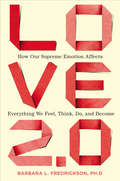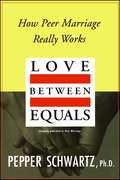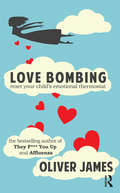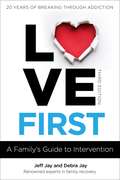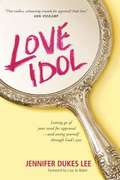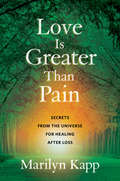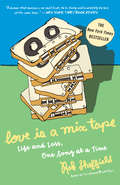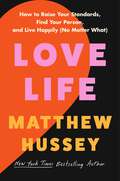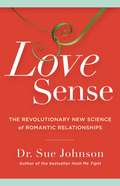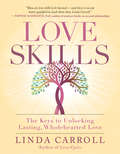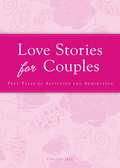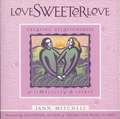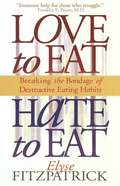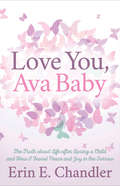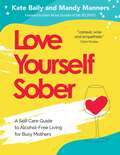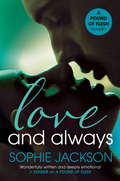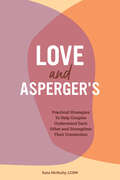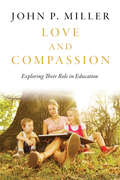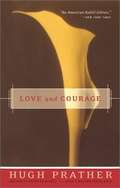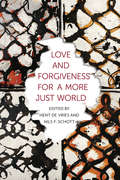- Table View
- List View
Love 2.0: Creating Happiness and Health in Moments of Connection
by Barbara L. FredricksonWe all know love matters, but in this groundbreaking book positive emotions expert Barbara Fredrickson shows us how much. Even more than happiness and optimism, love holds the key to improving our mental and physical health as well as lengthening our lives. Using research from her own lab, Fredrickson redefines love not as a stable behemoth, but as micro-moments of connection between people--even strangers. She demonstrates that our capacity for experiencing love can be measured and strengthened in ways that improve our health and longevity. Finally, she introduces us to informal and formal practices to unlock love in our lives, generate compassion, and even self-soothe. Rare in its scope and ambitious in its message, Love 2.0 will reinvent how you look at and experience our most powerful emotion.
Love Bombing: Reset Your Child's Emotional Thermostat
by Oliver James"Love Bombing" is a radical new method for resetting the emotional thermostats of troubled children and their parents, setting them on a much happier trajectory. It is simple to do, easily explained and works for both severe and mild problems from aged three to early teenage. Many, if not most, parents feel that their children may have missed out in some way during the early years. Offering a simple, relatively trouble-free self-help method for putting that right is what parents are waiting for. "This book is written in highly accessible language", assures Oliver James. "The method is explained as simply as possible, illustrated with cases". "Love Bombing is a very simple technique which helps most children from aged three to early teenage. Because so many parents are, or have had, periods of living very busy or miserable or complicated lives, most of us need to reconnect with our children from time to time. Love Bombing does the job," explains James.
Love First: A Family's Guide to Intervention (Love First Family Recovery)
by Debra Jay Jeff JayThis revised and expanded third edition of the gold-standard for intervention provides clear steps for harnessing the power of family, friends, and professionals to create a better future with loved ones suffering from addiction. Over the course of the last twenty years, Love First has become the go-to intervention guide for tens of thousands of families. This trailblazing book empowers and equips families and friends to use the power of love and honesty to give their addicted loved ones a chance to reach for help. Updated with the latest addiction science as well as insights gained from decades of front-line experience in family interventions, this revised and expanded edition contains practical tools for taking the next step together: transforming the intervention team into an ongoing community of loving support, lasting accountability, and lifelong recovery.
Love Idol: Letting Go of Your Need for Approval and Seeing Yourself through God's Eyes
by Jennifer Dukes LeeWe all want someone to think we’re sensational. We desire to be recognized, to be valued, to be respected. To be loved. Yet this natural yearning too often turns into an idol of one of God’s most precious gifts: love itself. If you, like so many of us, spend your time and energy trying to earn someone’s approval―at work, home, and church―all the while fearing that, at any moment, the facade will drop and everyone will see your hidden mess... then love may have become an idol in your life. In this poignant and hope-filled book, Jennifer Dukes Lee shares her own lifelong journey of learning to rely on the unconditional love of God. She gently invites us to make peace with our imperfections and to stop working overtime for a love that is already ours. Love Idol will help us dismantle what’s separating us from true connection with God and rediscover the astonishing joy of a life full of freedom in Christ.
Love Is Greater Than Pain: Secrets from the Universe for Healing After Loss
by Marilyn KappAn extraordinary new mindful approach to healing after loss that taps into everyone&’s ability to continue their relationship with those who have passed.&“Marilyn&’s vast and masterful experience in communicating with passed loved ones illustrate what they want to teach us.&”—Betty Jampel, LCSWWhen Marilyn Kapp was two years old, she watched her grandfather leave his body. He told her he would be back and he was true to his word. When Marilyn realized that others did not share her perception of the spiritual plane, she kept her channeling abilities to herself and her family. This changed when, as a college student, she met writer, Holocaust survivor, and future Nobel laureate Elie Wiesel. He became her mentor and encouraged her to use her perception to help others.In Love Is Greater Than Pain, Marilyn shares her profound understanding of the afterlife. Today a renowned medium, Marilyn reveals the beauty in the transition from the physical to the spiritual plane, helping those who are dying, as well as those left behind. With personal stories and transcripts from channeling sessions, Marilyn teaches us how to interact with the afterlife and to joyfully embrace the reality that love truly is greater than pain.Marilyn shares universal messages of comfort, forgiveness, and understanding, including specific guidance for bereaved parents, for those dealing with dementia, and even for people who are grieving for their animal friends. Marilyn&’s groundbreaking seminal work offers practical advice, clear takeaways, and a new approach to death, grieving, and living your best life, sharing concrete steps for:• Raising your personal vibration to increase health, joy, and the ability to receive channeled information and love.• Helping yourself and others honor life while grieving.• Understanding the parallel process of growth that we share with those who have passed.When we honor life as we grieve, we offer healing and support to one another, as well as conscious collaboration with those who have passed.
Love Is a Mix Tape: Life, Loss, and What I Listened To
by Rob Sheffield&“The happiest, saddest, sweetest book about rock &‘n&’ roll that I&’ve ever experienced.&”—Chuck Klosterman Mix tapes: We all have our favorites. Stick one into a deck, press play, and you&’re instantly transported to another time in your life. For Rob Sheffield, that time was one of miraculous love and unbearable grief. A time that spanned seven years, it started when he met the girl of his dreams, and ended when he watched her die in his arms. Using the listings of fifteen of his favorite mix tapes, Rob shows that the power of music to build a bridge between people is stronger than death. You&’ll read these words, perhaps surprisingly, with joy in your heart and a song in your head—the one that comes to mind when you think of the love of your life. Praise for Love is a Mixtape &“A memoir that manages, no small feat, to be funny and beautifully forlorn at the same time.&”—The New York Times Book Review &“Humorous, heartbreaking, and heroic.&”—Entertainment Weekly &“The finest lines ever written about rock &‘n&’ roll . . . Like that song on the radio, every word of Rob&’s book is true. Love is a mix tape.&”—Rolling Stone &“Many of us use pop culture as a mirror of our emotional lives, but Sheffield happily walks right through the looking glass.&”—Los Angeles Times &“Sheffield writes with such aching remembering, you feel like you are invading his privacy . . . and it&’s the truth of those details that make this memoir so touching.&”—Newsweek
Love Life: How to Raise Your Standards, Find Your Person, and Live Happily (No Matter What)
by Matthew HusseyNEW YORK TIMES BESTSELLERUSA TODAY BESTSELLERINTERNATIONAL BESTSELLERAn essential set of tools and principles for healing your heart, finding love, and loving life.Finding love can be hard. Being single can feel even harder. In Love Life, world-renowned coach and New York Times bestselling author Matthew Hussey provides a practical roadmap for letting go of past relationships, overcoming the fear of getting left behind, and finding the love we want.Sometimes it feels like life and love are working against us. Just finding someone we like can be a struggle. Even when we do, we often find they’re not ready, or they want different things. Then there are the internal fears and anxieties that lead us to self-sabotage—that make us indulge the wrong behavior in others, hold back from expressing our needs for fear of losing someone, or overinvest in people and lose ourselves in the process. Love Life sheds light on these common patterns and how to overcome them, by showing us how to adopt new standards, elegantly communicate them, and develop the deepest levels of confidence that underpin them. Like many of us, Hussey has gone through major life changes over the past decade, and he opens up about his experiences, vulnerabilities, and mistakes.Love Life is about doing love better. More than a book about romantic relationships, Love Life shows us how to take control of each of the major relationships in our lives: our relationship with others, our relationship with ourselves, and our relationship with life itself.Our love lives have the power to elevate or eradicate the adjacent joy in our lives. Love Life sets you on the path to finding the love of your life, while deepening your love for life.
Love Secrets for a Lasting Relationship
by Harold H. Bloomfield Natasha Josefowitz[From the inside book flap:] From the bestselling co-author of How to Survive the Loss of a Love comes an encouraging, inspiring, and irresistible book of love "lessons"--exercises to hell you create a vibrant, deeply rewarding, and lasting love relationship. Making love last isn't easy--but you can do it. In Love Secrets for a Lasting Relationship, eminent psychiatrist and bestselling author Dr. Harold Bloomfield shows you how, whether you're seeking to revitalize a long-term relationship or deepen the intimacy of a new romance. Love Secrets is a book to read on your own or share with your love partner--a book of more than seventy "love secrets," each with specific love exercises to help you apply what you've learned for intimate and passionate results. You'll discover that, as in exercising your muscles, love grows stronger with practice. A great relationship doesn't just happen--you create it. Interspersed with these simple yet profound lessons are Natasha Josefowitz's witty and delightful poems on the joys and challenges of contemporary life and love. A perfect gift for the one you love, Love Secrets for a Lasting Relationship is also a life-changing gift to give yourself.
Love Sense: The Revolutionary New Science Of Romantic Relationships
by Sue JohnsonThe bestselling author of Hold Me Tight presents a revolutionary new understanding of why and how we love, based on cutting-edge research. Every day, we hear of relationships failing and questions of whether humans are meant to be monogamous. LOVE SENSE presents new scientific evidence that tells us that humans are meant to mate for life. Dr. Johnson explains that romantic love is an attachment bond, just like that between mother and child, and shows us how to develop our "love sense"--our ability to develop long-lasting relationships. Love is not the least bit illogical or random, but actually an ordered and wise recipe for survival. LOVE SENSE covers the three stages of a relationship and how to best weather them; the intelligence of emotions and the logic of love; the physical and psychological benefits of secure love; and much more. Based on groundbreaking research, LOVE SENSE will change the way we think about love.
Love Skills: The Keys to Unlocking Lasting, Wholehearted Love
by Linda CarrollAn incisive &“couple&’s workshop in a book&” for navigating the challenges of relationships and unlocking lasting love Linda Carroll&’s first book, Love Cycles, describes the five stages of intimate relationships in detail, illuminating the behaviors associated with each stage and strategies for successfully navigating them. This companion workbook, Love Skills, is a practical guide to creating and maintaining a loving relationship. Exercises, activities, self-assessments, and other concrete tools allow readers to understand where they are in their relationship. Carroll addresses such thorny issues as the loss of sexual energy, why what once seemed endearing is now annoying, and the many ways that family history and personality type can wreak havoc in relationships. Her well-researched practices help keep love alive in the midst of seemingly intractable differences, and specific, effective solutions to couples&’ most common struggles provide a clear map for moving forward. Most important, Carroll&’s couple-tested techniques allow readers to deal with conflict without losing connection, and show that conflict, when navigated properly, can lead to renewed closeness and unprecedented connection.
Love Stories for Couples: True tales of affection and admiration (Cup of Comfort Stories)
by Colleen SellEvery couple has a story to tell. In Love Stories for Couples, you’ll find three true love stories capture the bitter, the sweet, and every moment in between. You’ll fall head over heels for the laughter, tears, and kisses in these stories - and be inspired to show the special person in your life just how much you care.
Love Sweeter Love
by Susan Jeffers Jann MitchellHow do we find the time to nurture relationships with the people we love? By simplifying. And Love Sweeter Love teaches us how to decide who and what is most important, work together as a couple, and savor life's sweetest moments. Mitchell has warm, practical, easy-to-understand advice for everyone--young, mature, single, married, or divorced--interested in creating simple, sacred time for love.
Love Sweeter Love
by Susan Jeffers Jann MitchellHow do we find the time to nurture relationships with the people we love? By simplifying. And Love Sweeter Love teaches us how to decide who and what is most important, work together as a couple, and savor life's sweetest moments. Mitchell has warm, practical, easy-to-understand advice for everyone--young, mature, single, married, or divorced--interested in creating simple, sacred time for love.
Love Sweeter Love: Creating Relationships Of Simplicity And Spirit
by Susan Jeffers Jann MitchellHow do we find the time to nurture relationships with the people we love? By simplifying. And Love Sweeter Love teaches us how to decide who and what is most important, work together as a couple, and savor life's sweetest moments. Mitchell has warm, practical, easy-to-understand advice for everyone--young, mature, single, married, or divorced--interested in creating simple, sacred time for love.
Love To Eat, Hate To Eat
by Elyse FitzpatrickNot just another diet book, Elyse Fitzpatrick helps women make realistic, practical steps toward proper eating, health, and emotional balance. With biblical guidelines for victory, this book is ideal for Christian women who want to fully yield this area of their lives to the Lord.
Love You, Ava Baby: The Truth About Life After Losing a Child and How I Found Peace and Joy in the Sorrow
by Erin E. ChandlerOne of the most devastating and life-changing moments a parent can face is experiencing the death of their child. Bereaved parents are often left unsupported in the swells of grief and the long-term reality of unending sorrow after trauma.Erin E. Chandler lost her own daughter, Ava, and spent years suffering alone, struggling with the debilitating physical, emotional, and mental effects of unexpressed anger and grief. In Love You, Ava Baby, Erin gives a raw and vulnerable account of her journey through Ava&’s life and death. She shares how she learned that the heartbreaking lows and the painful face of grief can actually lead to a life filled with joy, purpose, and miracles.
Love You, Mean It: A True Story of Love, Loss, and Friendship
by Eve Charles Julia Collins Claudia Gerbasi Ann Haynes Patricia CarringtonWhen their husbands went to work on September 11, 2001, these four women never thought they would never see them again. After the horrific events of this one day, they had to re-build their lives again and learn to live and love with out "the boys". they form the Widdows Club, (WC) and with each others help, they are able to move on, and learn to live and love again.
Love Yourself Sober: A Self Care Guide to Alcohol-Free Living for Busy Mothers
by Mandy MannersWith questions around the 'Mummy Wine O'clock' culture growing, Love Yourself Sober explores how a problematic relationship with alcohol can easily develop, particularly with time-poor mothers, how to recognise it, and what to do about it. Kate and Mandy provide a supportive 'sober curious' environment, encouraging active participation using positive psychology, coaching methods and workbook features to help women make changes for themselves. Love Yourself Sober is an empowering book for women and mothers to put their own self-care at the centre of a healthy and positive life-change.
Love Yourself Sober: A Self Care Guide to Alcohol-Free Living for Busy Mothers
by Mandy MannersWith questions around the 'Mummy Wine O'clock' culture growing, Love Yourself Sober explores how a problematic relationship with alcohol can easily develop, particularly with time-poor mothers, how to recognise it, and what to do about it. Kate and Mandy provide a supportive 'sober curious' environment, encouraging active participation using positive psychology, coaching methods and workbook features to help women make changes for themselves. Love Yourself Sober is an empowering book for women and mothers to put their own self-care at the centre of a healthy and positive life-change.
Love and Always: A powerful, addictive love story (A Pound of Flesh)
by Sophie JacksonLove and Always is the second title in the A Pound of Flesh series from fan-fiction superstar Sophie Jackson.Fans of Samantha Young, Jodi Ellen Malpas, Jamie McGuire, Katy Evans and Prison Break will find Sophie Jackson's powerful love stories utterly addictive and unforgettable. Carter and Kat's story of love and redemption continues in Love and Always - a novella in the sensational A Pound of Flesh series. Theirs was a love that broke every rule. But the searing attraction between Wes Carter and Kat Lane was instant and impossible to deny. Against all the odds, this all-consuming love between prison tutor Kat and her dangerous, brooding student flourished and healed the deep scars borne by each of them. But as they face real life together and share the news of their engagement with those closest to them, Kat and Carter realise that they will still have to fight for their love if it is to survive forever and...always.Loyalty, redemption and all-consuming love against the odds. Check out the whole A Pound of Flesh series: A Pound of Flesh, Love and Always, An Ounce of Hope, Fate and Forever and A Measure of Love.
Love and Asperger's: Practical Strategies To Help Couples Understand Each Other and Strengthen Their Connection
by Kate McNulty LCSWLife with a partner whose neurotype is different than yours is filled with moments that can be surprising, unique, and sometimes challenging. Love and Asperger's is a helpful guide to everyday techniques to strengthen empathy and connection between neurodiverse couples—while keeping your love for each other at the center of everything. Life with a partner whose neurotype is different than yours is filled with moments that are surprising, unique, and sometimes challenging. If one of you is on the Autism Spectrum and the other is neurotypical, this Aspergers books is a helpful and inclusive guide to understanding the nature of your relationship and navigating its particular obstacles—while keeping your love for each other at the center of everything.Even though Aspergers is no longer an official diagnosis, many people—like you or your partner—may still fit the Aspergers profile and identify with the term. This book is designed with you in mind, featuring expert advice from relationship therapist Kate McNulty. Inside, you'll find engaging scenarios of couples experiencing similar challenges, combined with practical, evidenced-based solutions that address the needs and perspectives of both partners equally.Love and Asperger's helps you:Work together—Find easy ways to improve communication, cultivate emotional and physical intimacy, and maintain a commitment to learning about each other.Appreciate your differences—Open a window into the inner world of your partner, and the ways in which their experiences differ from yours so you can convey your own perspective more effectively.Break through the stereotypes—Sort out myths and facts so you can understand neurotypical and neurodiverse thinking and make your life together as a couple more loving and more rewarding.Deepen your relationship and your communication with an enlightening book on Aspergers and love.
Love and Compassion: Exploring their Role in Education
by John P. MillerAcademics often speak about love for their subject, mathematicians discuss their love for figures and numbers, and elementary school teachers speak about their love of children. As multidimensional as love is, it is often a taboo subject relative to teachers and students. In Love and Compassion, John P. Miller explores different forms of love, including self-love, the love of others, compassion, the love of learning, and cosmic love, and how these dimensions of love have the potential to improve education. Love and Compassion is both a practical and conceptual work, and will interest those involved in the study and practise of holistic and contemplative education. In addition to the seven dimensions of love, Miller’s evaluation includes nonviolent action, the love of beauty, and how they are crucial to the practise of teaching.
Love and Forgiveness for a More Just World (Religion, Culture, and Public Life #24)
by Hent De Vries Nils SchottOne can love and not forgive or out of love decide not to forgive. Or one can forgive but not love, or choose to forgive but not love the ones forgiven. Love and forgiveness follow parallel and largely independent paths, a truth we fail to acknowledge when we pressure others to both love and forgive. Individuals in conflict, sparring social and ethnic groups, warring religious communities, and insecure nations often do not need to pursue love and forgiveness to achieve peace of mind and heart. They need to remain attentive to the needs of others, an alertness that prompts either love or forgiveness to respond. By reorienting our perception of these enduring phenomena, the contributors to this volume inspire new applications for love and forgiveness in an increasingly globalized and no longer quite secular world. With contributions by the renowned French philosophers Jacques Derrida and Jean-Luc Marion, the poet Haleh Liza Gafori, and scholars of religion (Leora Batnitzky, Nils F. Schott, Hent de Vries), psychoanalysis (Albert Mason, Orna Ophir), Islamic and political philosophy (Sari Nusseibeh), and the Bible and literature (Regina Schwartz), this anthology reconstructs the historical and conceptual lineage of love and forgiveness and their fraught relationship over time. By examining how we have used—and misused—these concepts, the authors advance a better understanding of their ability to unite different individuals and emerging groups around a shared engagement for freedom and equality, peace and solidarity.
